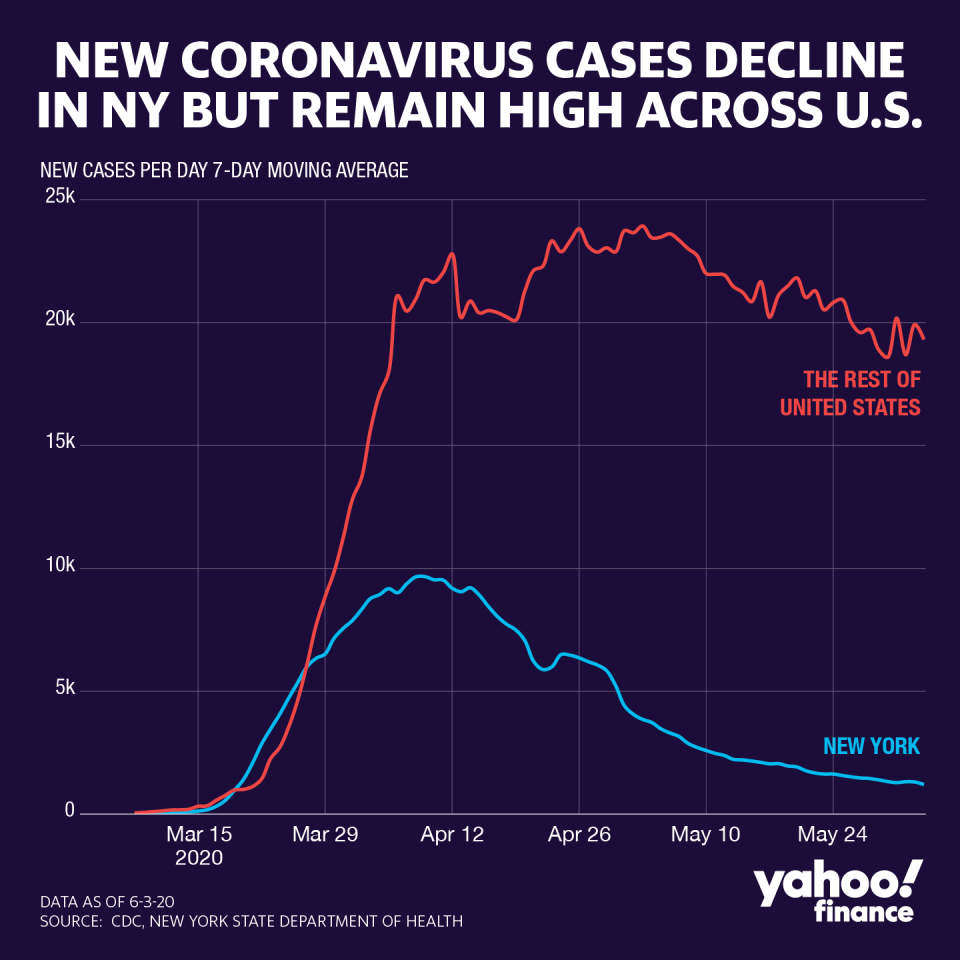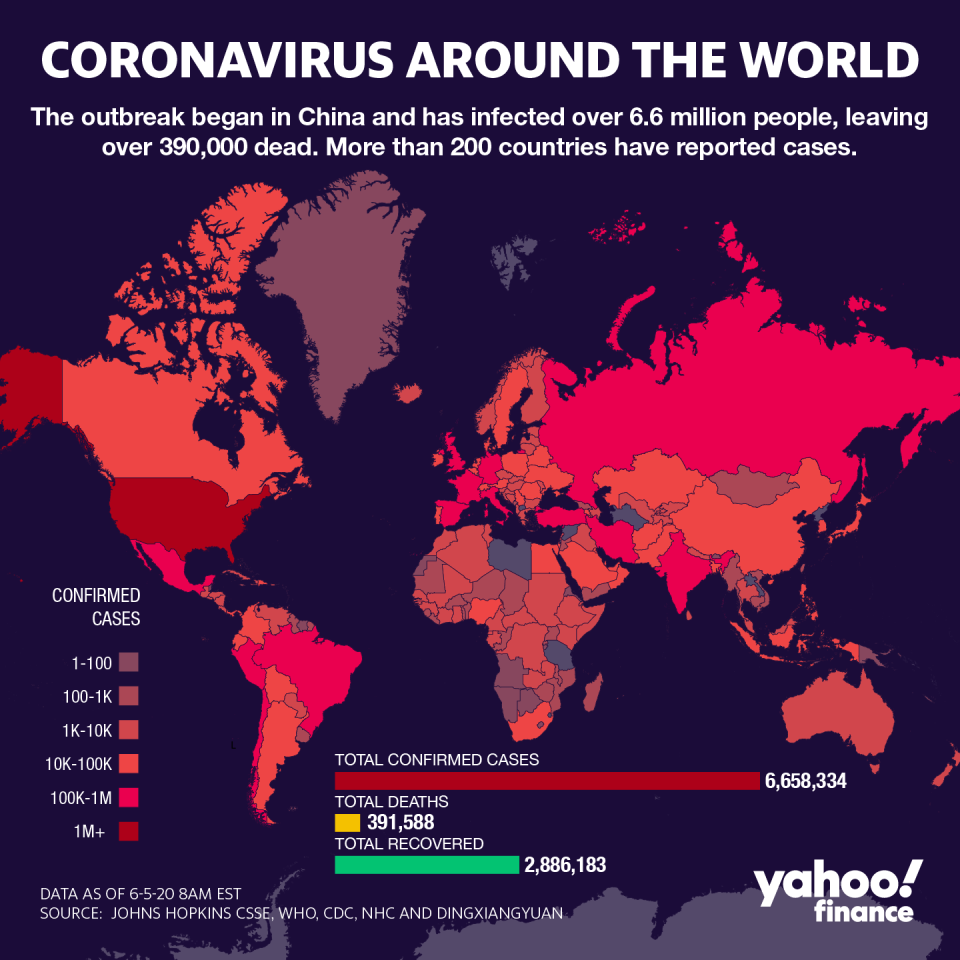Coronavirus update: Payrolls spark hope for a fast rebound as Novavax gets a boost in vaccine race
Stunning news that the U.S. economy added over 2.5 million jobs in May fanned hopes for a rapid rebound, and fed into growing optimism about cities and states relaxing the coronavirus-related restrictions that have hobbled activity and crushed the jobs market.
Friday’s non-farm payrolls report, which showed the U.S. unemployment rate unexpectedly dropping to 13.3%, boosted the market’s growing belief that the economy would rebound sooner rather than later. It also shed new light on the impact of states reopening their economies, despite ongoing concerns about a resurgence in COVID-19 infections.
However, ongoing protests against the killing of George Floyd in Minneapolis at the hands of police officers have resulted in riots and damaged businesses. The mass demonstrations taking place across America have also worried public health officials that the virus could see a dreaded second wave — especially with infections outside of New York, the U.S.’s largest COVID hot zone, on the rise.
Dr. Robert Redfield, director of the Centers for Disease Control and Prevention (CDC), told Congress at a subcommittee hearing Thursday he is concerned about more spreading.
“I do think there is a potential unfortunately for this to be a seeding event,” he said, adding that protestors should consider getting tested.
Novavax gets a boost for vaccine efforts

As expectations grow that potentially effective coronavirus treatments may be discovered, the Department of Defense has contracted with Novavax (NVAX) for up to $60 million to produce 10 million doses of the biotech’s vaccine candidate.
If all goes well, it would add to the potential available doses in the U.S. once Novavax gets an emergency use authorization. The company’s vaccine entered into phase 1 clinical trials at the end of May.
In a prepared statement, Novavax CEO Stanley Erck said the deal represented “a critical step in our ability to provide vaccine support to the COVID-19 pandemic.”
The contract is a separate line of federal support from the White House’s Operation Warp Speed, which is backing vaccine candidates from Pfizer (PFE), Merck (MRK), Johnson & Johnson (JNJ), Moderna (MRNA) and Oxford University to provide vaccines for the general U.S. population.
AstraZeneca (AZN) is working with Oxford to scale up production of its vaccine candidate, and has agreed to do to for the U.S., U.K., and recently for lower-income countries through Gavi, the global vaccine alliance, and The Serum Institute of India.
Separately, the Army is pursuing its own coronavirus vaccine, with a target date of year’s end.

Meanwhile, the saga over hydroxychloroquine’s effectiveness as a treatment for the coronavirus took a new turn Thursday, when a top medical journal retracted a study that underscored risks to using the anti-malarial drug on COVID-19 patients.
The Lancet, which published a study in late May that resulted in the World Health Organization temporarily halting its own trials, issued a retraction Thursday, saying it could “no longer vouch for the veracity of the primary data sources.”
It added: “Due to this unfortunate development, the authors request that the paper be retracted.” The Lancet retroactively analyzed data from a little-known firm, U.S.-based Surgisphere, which provided vague and questionable data about the use of the drug in trial sites.
In a related move, The New England Journal of Medicine (NEJM) — which also published a study using Surgisphere data focused on different drugs— also retracted its study.
The drug has been touted by President Donald Trump, who also recently revealed he is taking it as a preventative measure. It is also used off-label as a treatment for rheumatoid arthritis and lupus.
The negative news surround such high profile journals could pose a problem for the science and public health world, according to Dr. Isaac Bogoch, an infectious disease specialist in Toronto.
“This is really troubling because it erodes the public trust in science and medicine, and perhaps in the advice from public health officials,” Bogoch told Yahoo Finance’s The Final Round.
“It does more than just portray data that might not be accurate. It can have a rippling effect in the general community. It’s so damaging and its upsetting to see,” he added.
Meanwhile, on Friday, a new U.K. study proved there was no improvement from the use of hydroxychloroquine as a treatment for hospitalized patients. The authors said they are still studying the data to see if there was any negative impact from using the drug.
Anjalee Khemlani is a reporter at Yahoo Finance. Follow her on Twitter: @AnjKhem
Read the latest financial and business news from Yahoo Finance
Follow Yahoo Finance on Twitter, Facebook, Instagram, Flipboard, SmartNews, LinkedIn, YouTube, and reddit.
